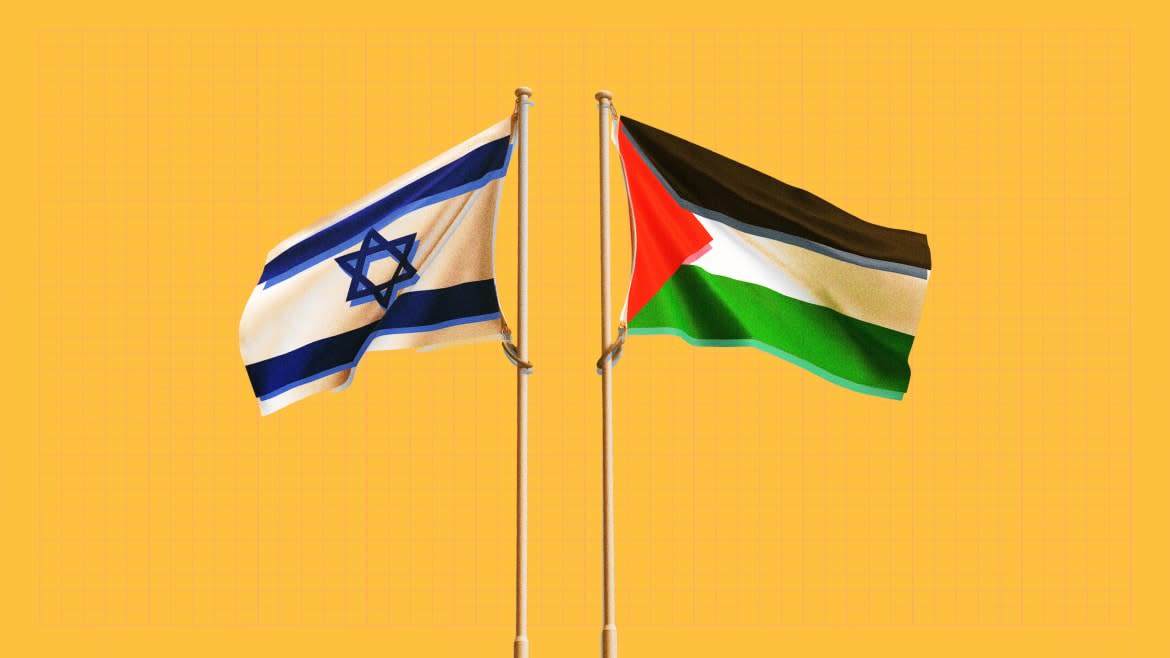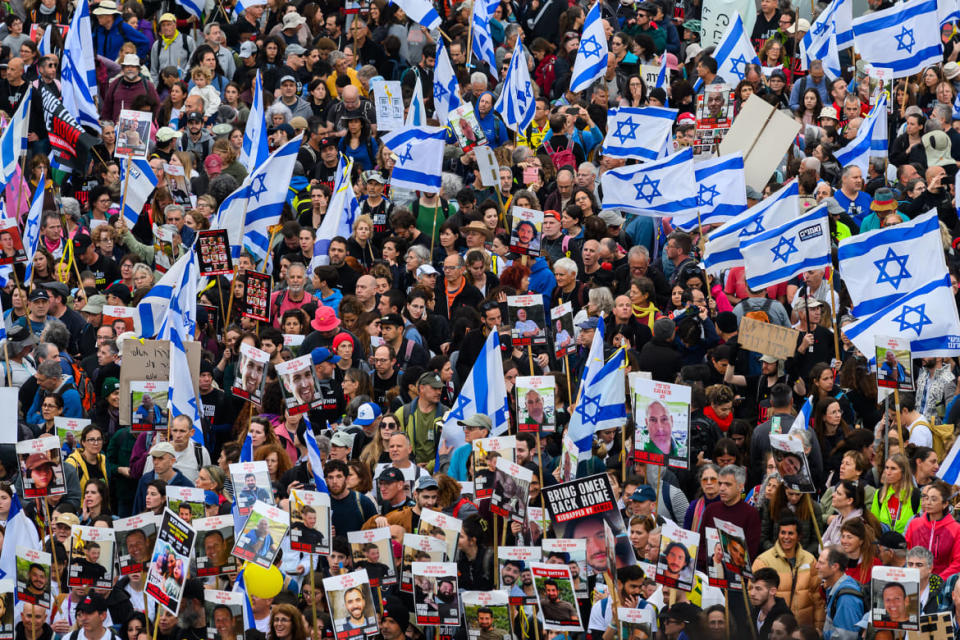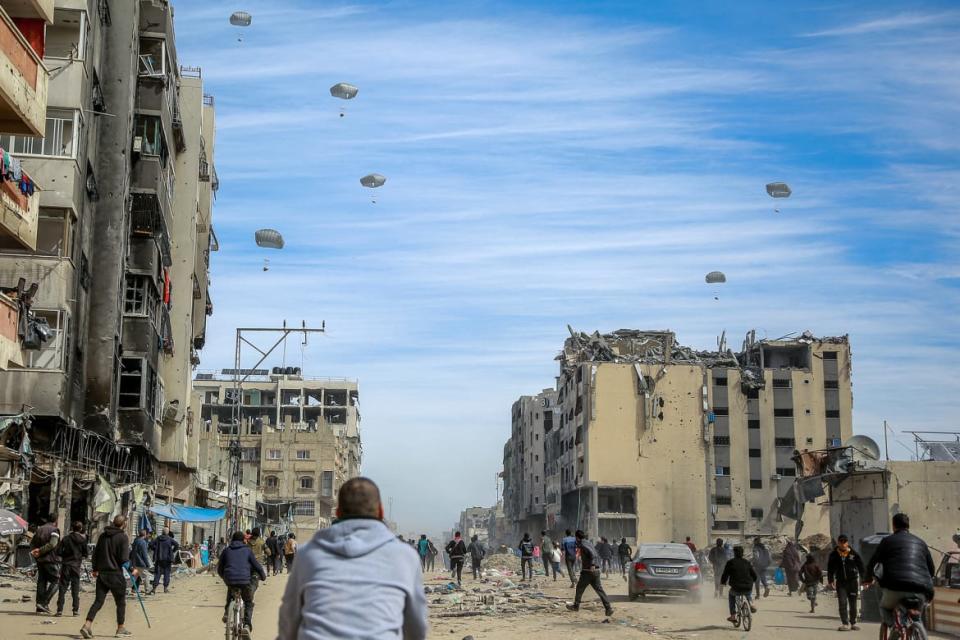U.S. and Western Recognition of a Palestinian State Would Ultimately Make Israel Safer

Jaded by failed peace talks and content with a relatively static status quo, Israel had been in no rush to finish eating the cake it was also having. That is, until Hamas’ Oct. 7 terrorist attack savagely transcended (and Israeli bombardment cemented) the “Palestinian cause” from a patronizing talking point to a global crisis and unresolved injustice.
Perhaps the single universal point of agreement about what must come is that there can be no return to what was. Gazans, of course, quite literally can’t go back to what was—as the enclave lies largely in ruins. And beyond that starting point, Prime Minister Benjamin Netanyahu has been largely relegated to an intransigent spectator as international consensus crystallizes around the idea and imperative of recognizing the State of Palestine.
Unilateral recognition of the State of Palestine—a radical action in a pre-Oct. 7 world—is a necessary and just measure to preserve the possibility of a two-state solution precisely at a time when the bleakest chapter in the Israeli-Palestinian conflict has seemingly delivered a death knell to the prospect of peace between the two peoples.
The Best Hope for Peace Is the Israeli Left. Don’t Abandon Them.
Recognition is an act of restorative justice. It rectifies a generational wrong—not the establishment of the State of Israel itself, but the failures of the international community, Israel, Arab leaders, and, yes, Palestinians themselves, to establish a concomitant Palestinian state.
But dwelling on past failures, the appropriate apportionment of blame, and even the specificities of recognition risk obscuring an inescapable truth: Palestinians are a people in need of independence.

Palestinians wait for food in Beit Lahia, in the northern Gaza Strip, on Feb. 26, 2024.
The apocalyptic scenes from Gaza couldn’t paint a more vivid testament. Tens of thousands dead, starving, orphaned, maimed, homeless, and hopeless. And then there are the daily indignities of the West Bank—the unrestrained settler violence, settlements, unjust evictions, home demolitions, etc. Combined, Gaza and the West Bank tell a stark story about how unsustainable and unjust statelessness has become and will continue to be.
That’s not to infantilize Palestinians or absolve Hamas, as their past rejectionism and terrorism have undoubtedly contributed to today’s realities. It is to suggest that recognition could unlock the conditions for a saner paradigm because it would offer Palestinians an alternative they’ve largely lacked: hope.
Lagging behind nearly 150 other countries, the West’s recognition would symbolize their sincerity toward redressing the Palestinians’ plight by transcending the mere lip service of a “two-state solution.”
Righteous in its own right, recognition and eventual independence would provide a measure of liberation—a second independence—for Israelis, too. Not liberation from Palestinians, but liberation from the psychological shackles of past traumas, present crises, and future bloodshed.

Thousands of people led by the families of hostages march into Jerusalem on the fourth and final day of the 'United for the Release the Hostages' march on March 2, 2024 in Jerusalem.
Israel’s very name, existence, and reputation would no longer be defined by nor tethered to its treatment of the Palestinians. Anti-Israel attitudes and outright antisemitism wouldn’t be cured, of course, but Palestinian sovereignty could rehabilitate Israel’s international standing that—thanks to Bibi and extremist members of his ruling coalition like Itamar Ben Gvir and Bezalel Smotrich—is steadily progressing toward outcast status.
Recognition would trigger broader regional acceptance, and the safety, economic, and cultural benefits that will follow.
For all the concern about the threat an independent Palestine would pose to Israel, the cruel irony is that Palestinian statehood represents a lifeline that would actually save Israel from its greatest existential threat: itself.
The Biden Administration’s Going All-In on Its Push for a Gaza Ceasefire
Kicking the can down the road can support Israeli hubris for only so long until reality beckons with an inconvenient truth: it is impossible for the State of Israel to remain both Jewish and democratic without the establishment of the State of Palestine.
Perhaps most importantly for Israelis, recognition and eventual independence would allow Israel to credibly honor its founding promise and raison d’être: being a safe haven for the Jewish people. The attacks of Oct. 7 didn’t bring to light the irrationality or inherent dangers of Palestinian statehood, they proved that the strategy of containment was nothing more than a house of cards.

Palestinians run along a street as humanitarian aid is airdropped in Gaza City on March 1, 2024. On February 26 an official from the UN humanitarian office OCHA said widespread starvation was "almost inevitable".
All Israelis have known since their miracle of statehood is the curse of conflict. Not by choice, of course. Parents—Israeli and Palestinian—could finally raise the first generation of children who truly know peace. Bouts of violence or lone wolf attacks wouldn’t cease, as is the case elsewhere, but the foreseeable tragedies of endless conflict would be rendered a relic.
Recognition is, therefore, the most “pro-Israel” thing President Joe Biden and Western leaders can do.
The understandable anxieties of traumatized Israelis notwithstanding, Netanyahu’s protestations should be taken with Dead Sea-size grains of salt.
The same man who shamelessly brags about preventing the establishment of a Palestinian state cannot, out of the other side of his mouth, convincingly claim that unilateral actions like recognition would taint the sanctity of the very direct negotiations he’s made a mockery of for his entire political career. It is precisely Netanyahu’s unwillingness to engage in good faith negotiations that leaves the Biden administration and the West with no choice but unilateral recognition to catalyze the unavoidable peace process.
Bibi’s feigned outrage is particularly rich, considering one need only look at the West Bank to appreciate his contempt for unilateralism. Legitimizing such naked bad faith would thus grant veto power over vital United States foreign policy to an admitted saboteur.
Do Americans Want a Ceasefire in Gaza? It Depends.
Equally disingenuous are claims that recognition would be tantamount to “rewarding” terrorism. Such a talking point overlooks the definitional premise: Hamas doesn’t want a two-state solution. “Giving” someone something they don’t want isn’t a reward, it’s a punishment.
Further baked into that faulty premise is the conflation of Hamas with all Palestinians, the belief that the Palestinians’ primary motivation is not sovereignty but the genocide of Jews, and the illusion that the occupation is a sustainable phenomenon whose bloody effects stop at Israel’s borders.
The perversity of rock bottom is that it has the power to resurrect hope in what has been a hopeless situation. Recognizing the State of Palestine—an overdue moral, ethical, safety, and strategic imperative for Palestinians and Israelis—is the starting point to a path of peace that cannot be bypassed. It may be our final chance.
Get the Daily Beast's biggest scoops and scandals delivered right to your inbox. Sign up now.
Stay informed and gain unlimited access to the Daily Beast's unmatched reporting. Subscribe now.


